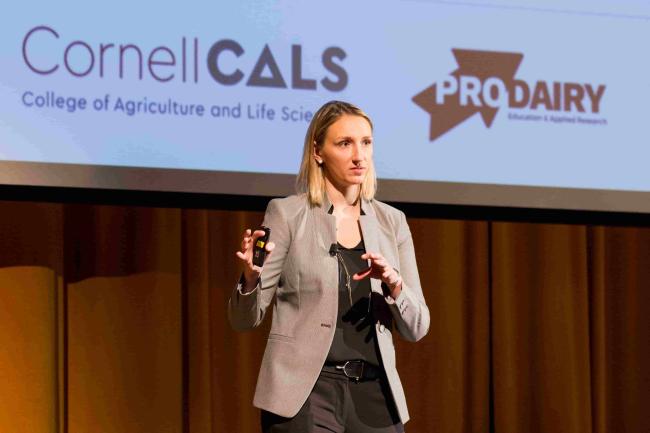
Cornell University expert delivers 2019 Lamont-Rhodes Lecture at NSU
ABERDEEN, S.D. – When it comes to creating their legacy, farmers face a difficult balance: ensuring their business lives on while also preserving their family assets.
Which is the more important goal?
“Ninety-nine percent of the time, the answer lies somewhere in the middle,” said Anna Richards of Cornell University during her March 26 presentation at Northern State University. “It’s generally a combination of both.”
Richards discussed strategies of balancing those goals, sharing her expertise on agricultural succession planning to almost 300 farmers, ranchers, small business owners, bankers and other area residents at the NSU Johnson Fine Arts Center.
Richards, a dairy business management specialist for PRO-DAIRY Education and Applied Research, delivered the fifth annual Lamont-Rhodes Lecture. This lecture series, hosted each year on the Northern campus, strives to bring top minds in agriculture and finance to Aberdeen to discuss relevant topics.
Topic Critical to Ag Economy
In his introduction of Richards, NSU President Dr. Tim Downs said succession planning is critical to our region’s agriculture economy.
“We’re thrilled to learn more about this topic and some of the best practices, and how the next generation of farmers and ranchers create a legacy and sustain that legacy,” Downs said.
Richards’ speech focused on managing the balance between family wealth and business assets. As farms move through generations, she said not all children are active in the farm – and yet parents still want to include those children in the planning.
When creating a succession plan, families should be sure it is tailored to their individual needs.
“Succession planning is a very, very personal thing,” Richards said.
Trusts Can Be Flexible Tools
Richards discussed terminology and processes related to a trust, which is essentially an arrangement where a person holds property for the benefit of someone else. Because they are so varied, trusts can be very flexible tools.
“A trust is whatever you want it to be within the confines of the law,” she said.
In the question-and-answer portion of her presentation, Richards fielded questions about what makes a good trustee, which is an individual responsible for executing the trust document. Her recommendations included:
- Choose at least two people – one person biased toward the business, one person biased toward the family.
- Choose someone with no stake in the outcome, who does not stand to benefit, but who has business or financial sense.
- Choose someone you would trust with your money.
- Choose someone familiar with your family.
- Choose someone younger than you (preferably).
She stressed the importance of communicating your intentions – because if no one understands your actual intent, or their role in your plan, it won’t do any good.
Richards' full presentation can be found here.
About the Lamont-Rhodes Lecture Series
The Lamont-Rhodes Lecture Series is sponsored by the NSU School of Business and Dacotah Bank, and hosted by the NSU Foundation. It is made possible thanks to contributions from descendants of longtime Aberdeen residents Ernest and Louise Rhodes, William and Frances (Peg) Lamont, and Robert and Ruth Lamont—families that have a long history of providing financial services to South Dakota farms, ranches and small business.
About Northern State University
Northern State University is a regional university that offers outstanding academics and exceptional extracurricular activities at an affordable price on a safe, welcoming campus. Northern State recently announced its Educational Impact Campaign, with a goal of raising $55 million for a new South Dakota School for the Blind and Visually Impaired, new athletic and recreation fields, and an on-campus regional sports complex. Once the campaign is complete, NSU will be the recipient of more than $100 million in privately funded building projects and scholarships within a decade. To learn more, visit NSU Admissions.
